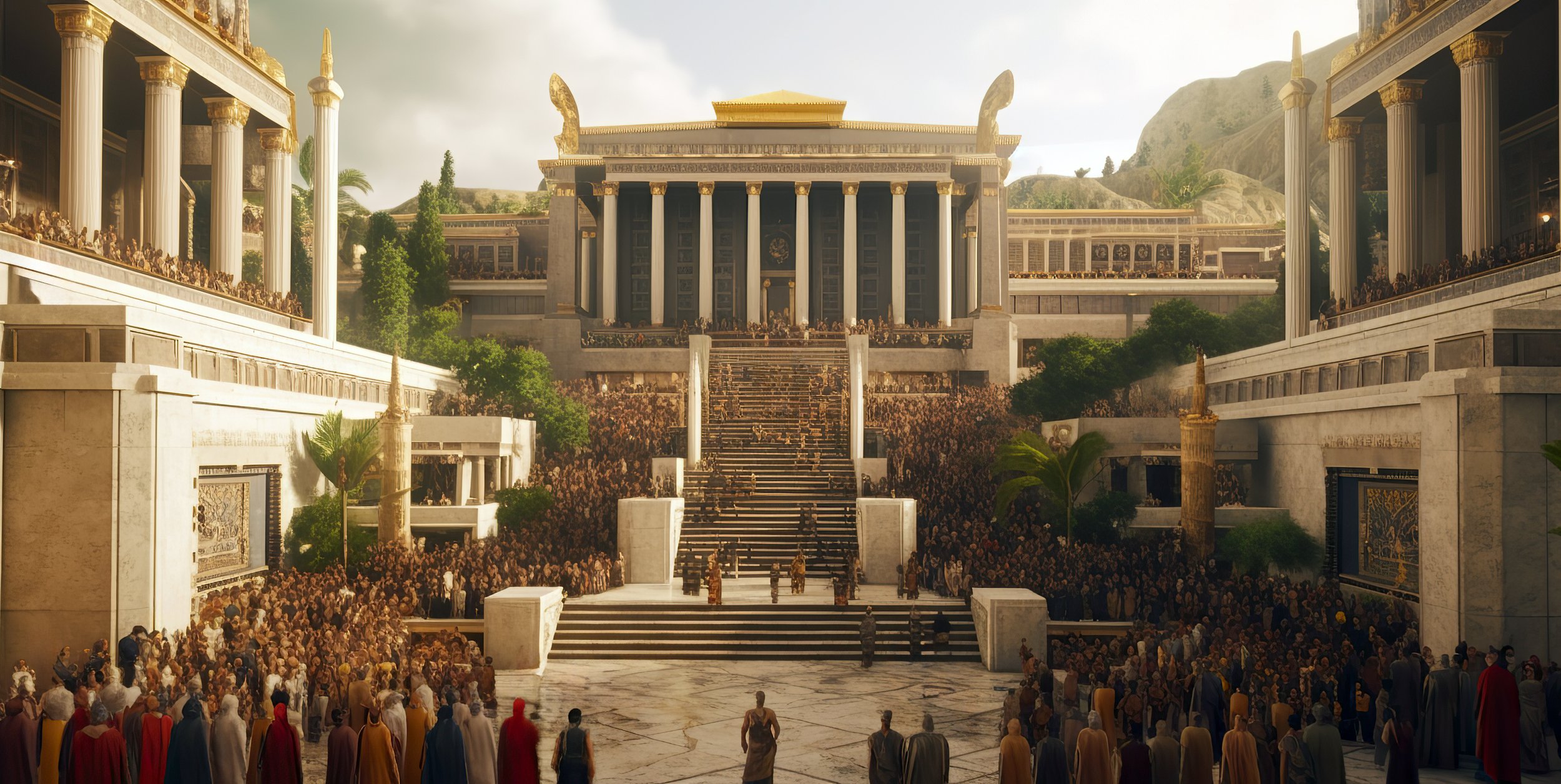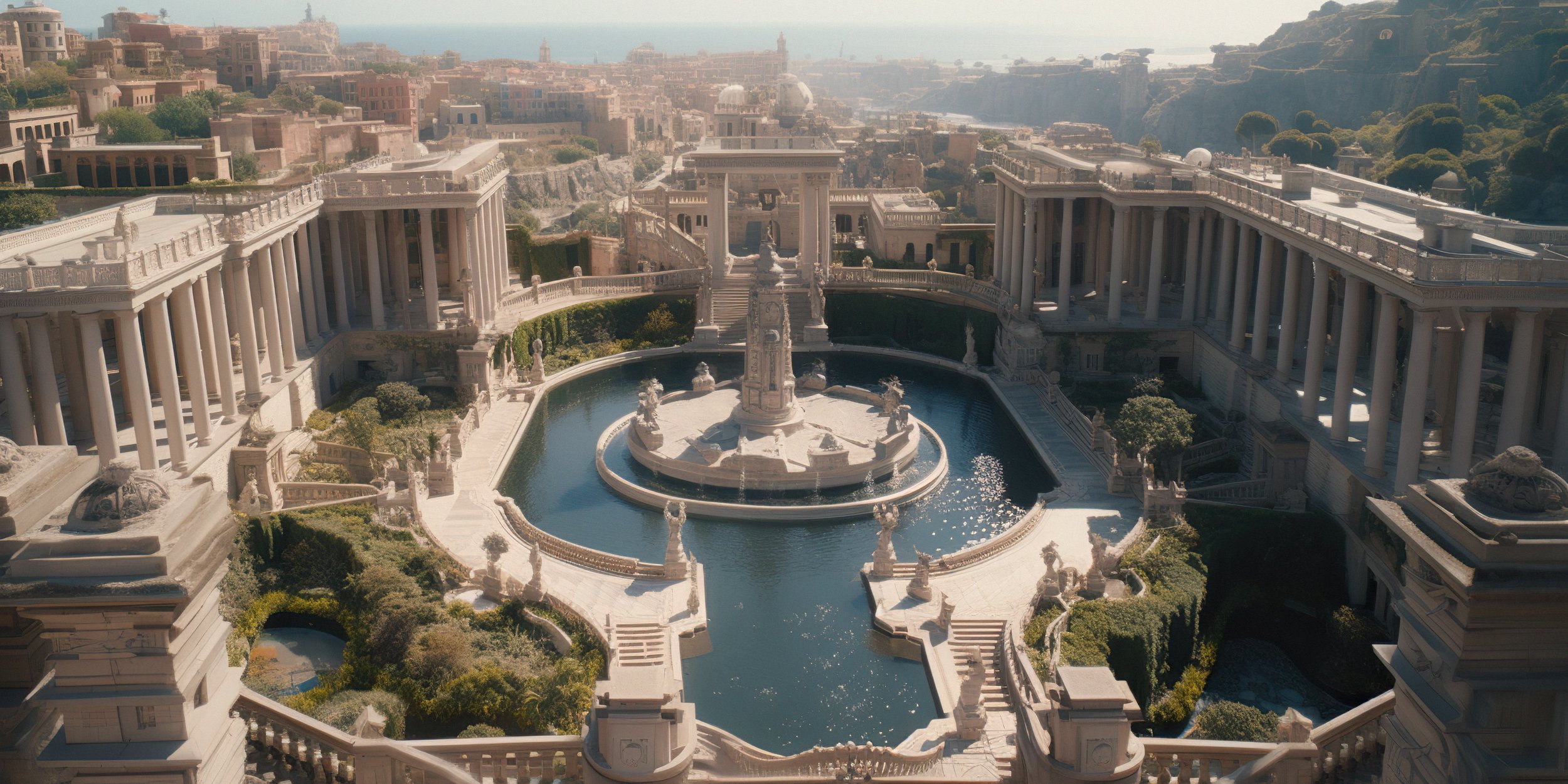
merging myth and magic
ANCIENT ATLANTIS

ANCIENT ATLANTIS
THE LOST WORLD

“ Now in this island of Atlantis there was a great and wonderful empire which had rule over the whole island and several others, and over parts of the continent”

The Birth of the Atlantis Legend
The story of Atlantis was first brought to life by the influential ancient Greek philosopher Plato in his works, "Timaeus" and "Critias." Plato described a highly advanced and mighty civilization, suggesting that it thrived around 9,000 years before Solon's era. Solon, a notable Greek figure, learned about the legends during his travels to ancient Egypt around 600 BC. Atlantis was said to be located beyond the "Pillars of Hercules," believed to be the modern-day Straits of Gibraltar.

AN ISLAND
LIKE NO OTHER

The Splendor of the Capital
Atlantis was an enormous island, measuring approximately 5,000 stadia (926 km or 575 miles) in circumference and divided into ten unique regions, each ruled by a distinct king. At the heart of the island lay a dazzling capital city, home to the reigning monarch. This breathtaking metropolis housed a majestic palace and a temple dedicated to Poseidon, adorned with walls of pure Orichalcum that emitted a fiery red glow. The island was also teeming with elephants and a myriad of exotic creatures.

A Civilization Ahead of Its Time
The Atlanteans were remarkably innovative in technology and engineering, far surpassing other civilizations of their time, many of which were still at the hunter gatherer stage. They constructed major canals, harbors, and dams, showcasing architectural prowess that surpassed even Rome or Athens nine millennia later. Additionally, their highly developed government and powerful, well-trained army set them apart as the first advanced civilization.

APHRODITE
QUEEN OF ATLANTIS

A RELUCTANT RULER
Witnessing the decay and corruption permeating the once resplendent Atlantis, Poseidon urged Aphrodite to take the reins and become the Queen of Atlantis. Bending the divine to the mortal, Aphrodite heeded Poseidon's plea out of profound love for him and a shared concern for Atlantis, taking the throne.

The Fall of a Great Society
Plato portrayed the Atlanteans as initially just and moral, but over time, they succumbed to greed and a lust for power, ultimately leading to their downfall. The extent to which this account is factual or simply crafted to appease the Greek gods remains a topic of debate. Some speculate that Zeus, king of the gods, grew envious of Atlantis's sophistication when other land-based civilizations were still in their infancy.

Mysteries Lost in the Sands of Time
Numerous modern theories have emerged to explain the enigmatic tale of Atlantis. Many historians and archaeologists dismiss it as a fictional story concocted by Plato to illustrate his ideas on politics and society. Some contend that it is rooted in a real historical event, such as the collapse of the Minoan civilization on Crete. Still, others propose a blend of fact and fiction, with elements of the story borrowed from earlier myths and legends.

The Legacy of a Fallen Empire
The truth, however, is more straightforward. Atlantis was real. Conceived by Poseidon as a beacon of light and truth for the world, its ultimate fate was sealed by a cataclysmic meteor, much like the dinosaurs. Had Atlantis endured, humanity might have been millennia ahead of where it stands today. Alas, it fell, and all Atlanteans perished, save for one: the future Emperor, offspring of Poseidon and Aphrodite, the last son of Atlantis—Atlas.

THE CRADLE OF ALL CIVILZATION?
The idea that ancient civilizations, like the Aztecs, might be descendants of the mythical Atlantis, as described by Plato, is a fascinating perspective that invites historians and us to consider alternative historical narratives. Those who subscribe to this theory often find parallels between the advanced nature of the Atlantean society, as described by Plato, and the technological and cultural achievements of the Aztec and other advanced for their time civilizations. There are also very many who doubt this hypothesis.
The proponents argue that these nations, such as the Aztecs, Mayans, Egyptians and the Celts could have inherited their advanced knowledge in areas such as astronomy, architecture, and agriculture from an ancient, highly developed source - Atlantis. Given some of these nation’s relatively late rise to power and their impressive advancements, some speculate that this knowledge could have been passed down from the remnants of the Atlantean society.
It would be fair to say that today, even modern Atlantis itself does not have all the answers to this question…





